Related Research Articles

Clinton Eastwood Jr. is an American actor and film director. After achieving success in the Western TV series Rawhide, Eastwood rose to international fame with his role as the "Man with No Name" in Sergio Leone's Dollars Trilogy of spaghetti Westerns during the mid-1960s and as antihero cop Harry Callahan in the five Dirty Harry films throughout the 1970s and 1980s. These roles, among others, have made Eastwood an enduring cultural icon of masculinity. Elected in 1986, Eastwood served for two years as the mayor of Carmel-by-the-Sea, California.
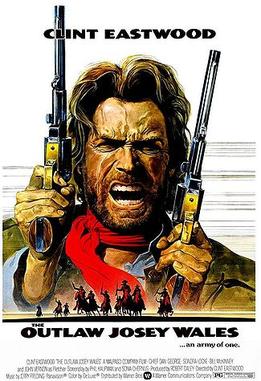
The Outlaw Josey Wales is a 1976 American revisionist Western film set during and after the American Civil War. It was directed by and starred Clint Eastwood, with Chief Dan George, Sondra Locke, Bill McKinney and John Vernon. During the Civil War, Josey Wales is a Missouri farmer turned soldier who seeks to avenge the death of his family and gains a reputation as a feared gunfighter. At the end of the war his group surrenders but is massacred, and Wales becomes an outlaw, pursued by bounty hunters and soldiers.
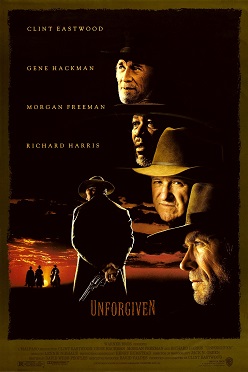
Unforgiven is a 1992 American Western film produced and directed by Clint Eastwood. It stars Eastwood himself, as William Munny, an aging outlaw and killer who takes on one more job, years after he had turned to farming. The film co-stars Gene Hackman, Morgan Freeman, and Richard Harris and was written by David Webb Peoples.

Dirty Harry is a 1971 American neo-noir action-thriller film produced and directed by Don Siegel, the first in the Dirty Harry series. Clint Eastwood plays the title role, in his first appearance as San Francisco Police Department (SFPD) Inspector "Dirty" Harry Callahan. The film drew upon the real-life case of the Zodiac Killer as the Callahan character seeks out a similar vicious psychopath.

For a Few Dollars More is a 1965 Spaghetti Western film directed by Sergio Leone. It stars Clint Eastwood and Lee Van Cleef as bounty hunters and Gian Maria Volonté as the primary villain. German actor Klaus Kinski plays a supporting role as a secondary villain. The film was an international co-production between Italy, West Germany, and Spain. The film was released in the United States in 1967, and is the second installment of what is commonly known as the Dollars Trilogy.
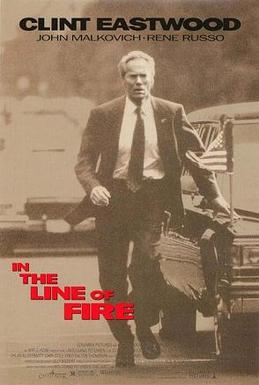
In the Line of Fire is a 1993 American political action thriller film directed by Wolfgang Petersen and starring Clint Eastwood, John Malkovich and Rene Russo. Written by Jeff Maguire, the film is about a disillusioned and obsessed former CIA agent who plans to assassinate the President of the United States and the Secret Service agent who is tracking him. Eastwood's character is the sole remaining active-duty Secret Service agent from the detail that was guarding John F. Kennedy in Dallas, Texas at the time of his assassination in 1963. The film also stars Dylan McDermott, Gary Cole, John Mahoney, and Fred Dalton Thompson.
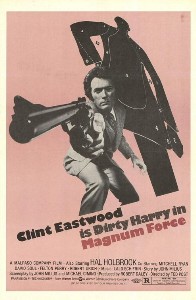
Magnum Force is a 1973 American neo-noir action-thriller film and the second to feature Clint Eastwood as maverick cop Harry Callahan after the 1971 film Dirty Harry. Ted Post, who had previously worked with Eastwood on Rawhide and Hang 'Em High, directed the film. The screenplay was written by John Milius and Michael Cimino. The film score was composed by Lalo Schifrin. This film features early appearances by David Soul, Tim Matheson, and Robert Urich. At 123 minutes, it is the longest of the five Dirty Harry films.
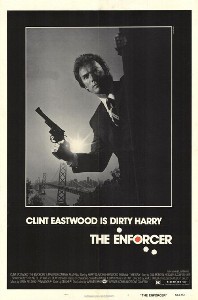
The Enforcer is a 1976 American neo-noir action-thriller film and the third in the Dirty Harry film series. Directed by James Fargo, it stars Clint Eastwood as Inspector "Dirty" Harry Callahan, Tyne Daly as Inspector Kate Moore, and DeVeren Bookwalter as criminal mastermind Bobby Maxwell. It was also the last film in the series to feature John Mitchum as Inspector Frank DiGiorgio.

Sudden Impact is a 1983 American neo-noir action-thriller film, the fourth in the Dirty Harry series, directed, produced by and starring Clint Eastwood and co-starring Sondra Locke. The film tells the story of a gang rape victim (Locke) who decides to seek revenge on her rapists 10 years after the attack by killing them one by one. Inspector Callahan (Eastwood), famous for his unconventional and often brutal crime-fighting tactics, is tasked with tracking down the serial killer.

Thunderbolt and Lightfoot is a 1974 American crime comedy film written and directed by Michael Cimino and starring Clint Eastwood, Jeff Bridges, George Kennedy and Geoffrey Lewis. The film follows John "Thunderbolt" Doherty, a disguised preacher who is almost killed before being unintentionally rescued by a young car thief named "Lightfoot", who partners with him in a series of thefts. It is soon discovered that "Thunderbolt" is a fugitive bank robber who is being hunted by his former gang.

Every Which Way but Loose is a 1978 American action comedy film released by Warner Bros. starring Clint Eastwood in an uncharacteristic and offbeat comedy role. It was produced by Robert Daley and directed by James Fargo. Eastwood plays Philo Beddoe, a trucker and bare-knuckle brawler roaming the American West in search of a lost love while accompanied by his brother/manager Orville and his pet orangutan Clyde. Philo encounters a wide assortment of characters, including a pair of police officers and a motorcycle gang who pursue him for revenge.
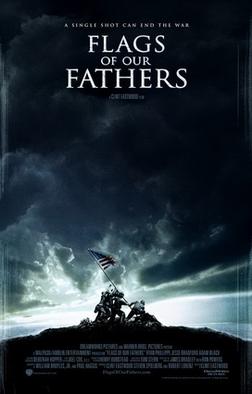
Flags of Our Fathers is a 2006 American war drama film directed, co-produced, and scored by Clint Eastwood and written by William Broyles Jr. and Paul Haggis. It is based on the 2000 book of the same name written by James Bradley and Ron Powers about the 1945 Battle of Iwo Jima, the five Marines and one Navy corpsman who were involved in raising the flag on Iwo Jima, and the after effects of that event on their lives. Taken from the American viewpoint of the Battle of Iwo Jima, the film is a companion piece to Eastwood's Letters from Iwo Jima, which depicts the same battle from the Japanese viewpoint; the two films were shot back to back.
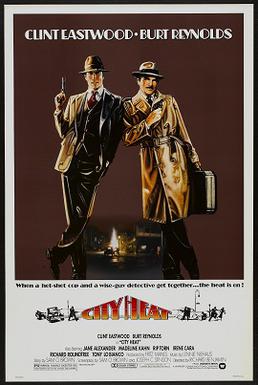
City Heat is a 1984 American buddy-crime comedy film starring Clint Eastwood and Burt Reynolds, written by Blake Edwards and directed by Richard Benjamin. The film was released in North America in December 1984.
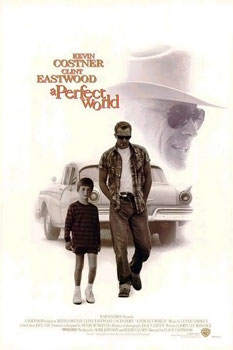
A Perfect World is a 1993 American thriller crime drama film directed by Clint Eastwood. It stars Kevin Costner as an escaped convict who takes a young boy hostage and attempts to escape on the road with the child. Eastwood co-stars as a Texas Ranger in pursuit of the convict.

Richard Warren Schickel was an American film historian, journalist, author, documentarian, and film and literary critic. He was a film critic for Time from 1965–2010, and also wrote for Life and the Los Angeles Times Book Review. His last writings about film were for Truthdig.
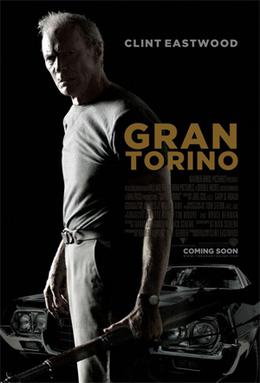
Gran Torino is a 2008 American drama film directed and produced by Clint Eastwood, who also starred in the film. The film features a large Hmong American cast, as well as one of Eastwood's younger sons, Scott. Eastwood's oldest son of record, Kyle, composed the film's score with Michael Stevens, while Jamie Cullum and Clint Eastwood provide the theme song.
Joyce Heims was an American screenwriter best known for her collaborations with actor-director Clint Eastwood. Born in Philadelphia, Heims moved out to the US west coast in early adulthood. She worked various jobs before starting a career writing for film and television during the 1960s. In addition to co-writing the story for Eastwood's role in Dirty Harry, Heims drafted the screenplay for Play Misty for Me, which served as Eastwood's own directorial debut in 1971. Heims continued to screenwrite throughout the decade before dying of breast cancer in 1978.

The Mule is a 2018 American crime drama film starring and directed by Clint Eastwood, and produced by Eastwood, Dan Friedkin, Jessica Meier, Tim Moore, Kristina Rivera, and Bradley Thomas. The screenplay, written by Nick Schenk, is based on the 2014 The New York Times article "The Sinaloa Cartel's 90-Year-Old Drug Mule" by Sam Dolnick, which recounts the story of Leo Sharp, a World War II veteran in his 80s who became a drug courier for the Sinaloa Cartel.

Richard Jewell is a 2019 American biographical drama film directed and produced by Clint Eastwood and written by Billy Ray. It is based on the 1997 Vanity Fair article "American Nightmare: The Ballad of Richard Jewell" by Marie Brenner and the 2019 book The Suspect: An Olympic Bombing, the FBI, the Media, and Richard Jewell, the Man Caught in the Middle by Kent Alexander and Kevin Salwen. The film depicts the July 27, 1996, Centennial Olympic Park bombing and its aftermath, as security guard Richard Jewell finds a bomb during the 1996 Summer Olympics in Atlanta, Georgia, and alerts authorities to evacuate, only to later be wrongly accused of having placed the device himself. Paul Walter Hauser stars as Jewell, supported by Sam Rockwell, Kathy Bates, Jon Hamm, and Olivia Wilde.

Spirited is a 2022 American Christmas musical comedy film directed by Sean Anders, and written and produced by Anders and John Morris. It is a modern retelling of Charles Dickens's 1843 novella A Christmas Carol and a satire of the various adaptations since. The film stars Will Ferrell, Ryan Reynolds, Octavia Spencer, Sunita Mani, Patrick Page, Marlow Barkley, and Tracy Morgan. In the film, The Ghost of Christmas Present is nearing retirement, which would mean a return to Earth. He sets his sights on an "unredeemable" man named Clint Briggs, who ends up helping the Ghost come to terms with his own past.
References
- 1 2 3 Bernard Weinraud (1993-07-20). "With 'Line of Fire,' Writer Discovers Ending for Hollywood-Failure Story". The New York Times .
- ↑ Glow International, belovedarchives.org. Accessed December 9, 2022.